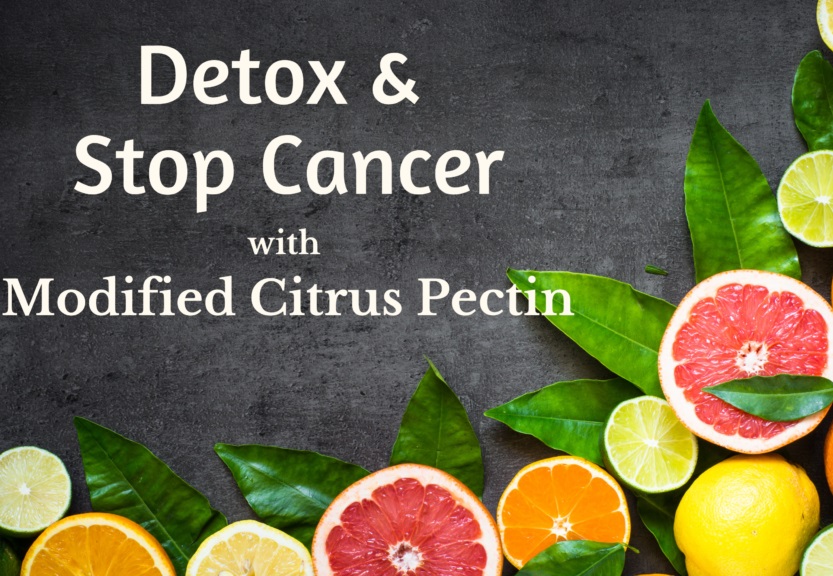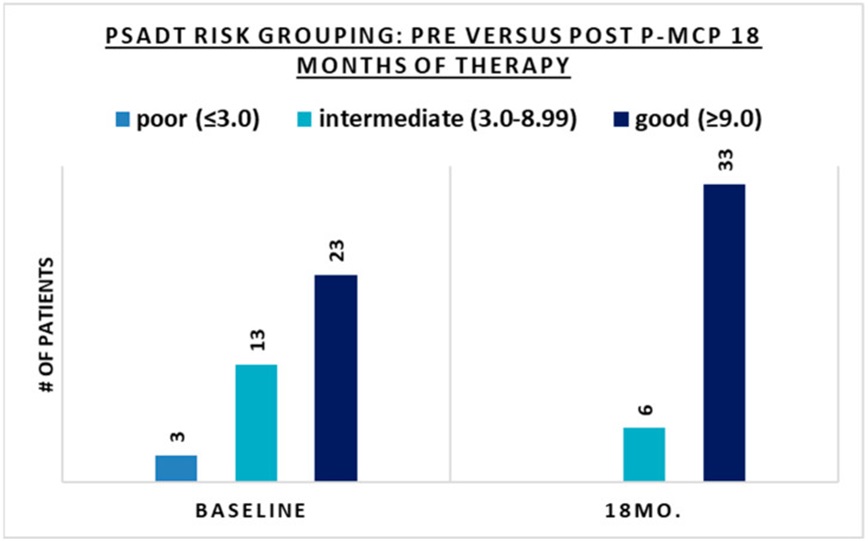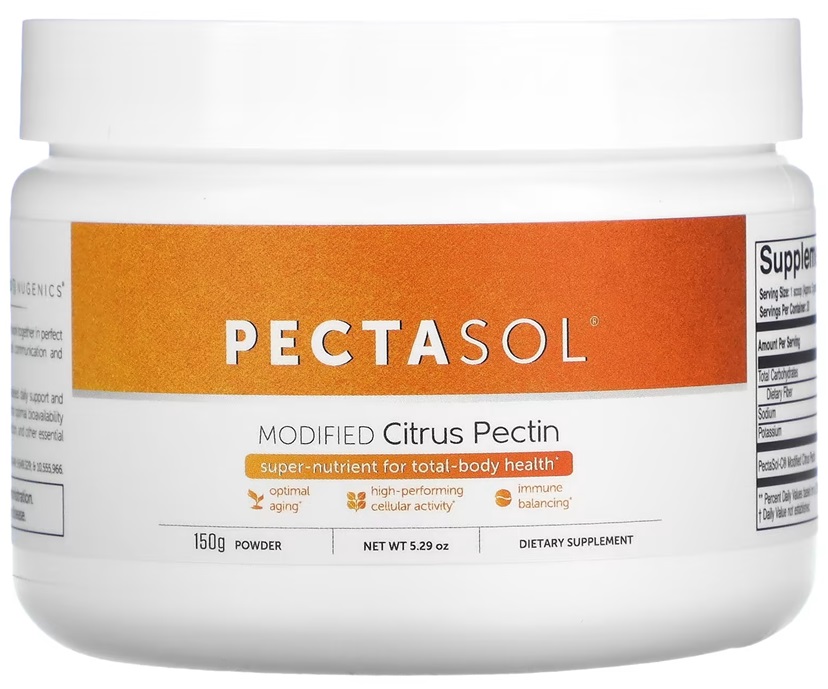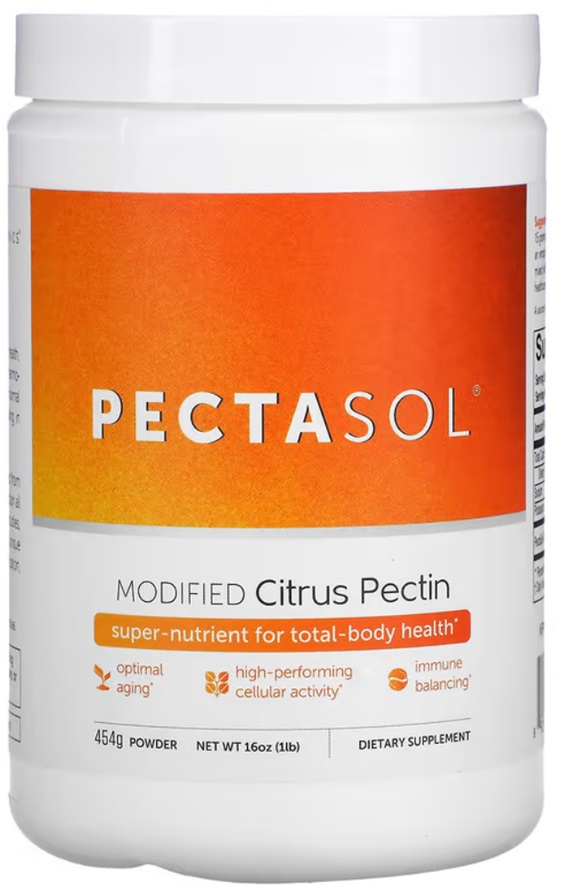改性柑橘果胶MCP--抗癌症转移

果胶是一种复杂的多糖,存在于陆生植物的初级细胞壁中。植物果胶在食品加工中广泛用作胶凝剂,在药物配方中用作稳定剂和不可生物降解的基质,以控制药物输送1。
简介
果胶是一种复杂的多糖,存在于陆生植物的初级细胞壁中。植物果胶在食品加工中广泛用作胶凝剂,在药物配方中用作稳定剂和不可生物降解的基质,以控制药物输送1。柑橘果胶(CP)存在于柑橘类水果的果皮和果肉中,可以通过高pH和热处理进行改性获得改性柑橘果胶(MCP)2。与复杂的长链CP相比,MCP短碳水化合物链具有更好的水溶性,更容易被肠上皮吸收进入循环3,因此,MCP又被称为小分子果胶(LCP)。临床前研究表明,MCP对结肠4,5、乳腺6、肝脏7和肺脏8等癌细胞系具有抑制作用。MCP可能通过干扰癌细胞转移9或诱导凋亡来发挥其抗癌作用10,2。初步临床数据表明,作为膳食纤维,MCP还有益于改善腹泻11和降低有毒重金属水平12,并可能降低高胆固醇血症13。
值得注意的是,果胶的不同来源和处理方法会影响其活性14,2。例如pH加工的MCP有助于抑制Gal-3活性,而对细胞凋亡作用较弱;经高温处理的MCP则对诱导细胞凋亡可能更具优势2。
MCP已成为最有前途的抗癌症转移药物之一15。MCP已被推广用于降低癌症风险和放射治疗造成的损害,但尚需要更多的研究证据支持16。在有限的人体研究中,MCP增加了前列腺癌患者前列腺特异性抗原的倍增时间17。
作用机制
MCP的分子靶点之一是半乳糖凝集素-3(Gal-3),这是一种存在于哺乳动物细胞表面和细胞内的蛋白质,参与许多细胞生理过程,包括细胞粘附、细胞活化和化学吸引、细胞生长和分化、细胞周期和凋亡18。Gal-3在肿瘤细胞转移、形成和进展中也起着关键作用19,20。作为Gal-3配体的竞争性抑制剂,MCP可调节Gal-3活性9。在体内。MCP与Gal-3的结合抑制了肿瘤生长、血管生成和转移21。在一项针对患有前列腺癌症的男性的试点研究中,MCP增加了PSA倍增时间(PSADT),可能是通过降低Gal-3活性17。MCP还通过半胱氨酸天冬氨酸蛋白酶-3活性在体外诱导腺癌细胞凋亡,导致DNA降解4。此外,MCP还被证明可以激活白血病细胞培养物中的自然杀伤(NK)细胞,这表明它可能刺激免疫系统22。
临床研究
虽然进行了大量的实验室研究,关于MCP的临床研究仍然较少,主要部分简介如下:1. 连续8周每天服用MCP 15g,晚期实体瘤患者生活质量改善且病情稳定23
在2007年的一项试点研究中,晚期实体瘤(各种类型的癌症,包括前列腺癌)患者接受MCP(5g MCP粉末溶于水中),每天3次,持续至少8周。治疗后,一些生活质量指标有所改善,包括身体功能、整体健康状况、疲劳、疼痛和失眠。此外,22.5%的参与者在接受MCP治疗8周后病情稳定,12.3%的参与者病情稳定超过24周23。
2.每天服用MCP 14.4g持续12个月,导致前列腺癌患者病情进展缓慢17
一项开放标记的II期试点研究评估了经活检证实的前列腺腺癌患者,这些患者在基线时未经治疗,前列腺特异性抗原(PSA)水平较低但逐渐升高(<10ng/mL)。患者服用MCP,剂量为每天18粒(14.4g),持续12个月。70%的患者PSA倍增时间(PSADT)延长。结果表明癌症进展缓慢,甚至可能延长寿命17。
3.前列腺癌患者服用MCP 4.8g x 3次/天6-12个月,PSADT明显改善、扫描呈阴性,安全且具有长期持久的疗效24-26。
在2019年美国临床肿瘤学会(ASCO)-泌尿生殖(GU)癌症研讨会上发表的一项开放标记II期研究的中期结果很有希望24。该研究评估了非去势非转移性生化复发前列腺癌症患者。34名患者服用MCP 4.8g×3/天,持续6个月。没有患者出现与治疗相关的3/4级毒性,而6名患者出现1级副作用(胀气和腹胀)。在这些患者中,21例(62%)PSA稳定或降低,扫描呈阴性,27例(79%)PSADT稳定或改善,扫描无转移24。这项研究仍在继续,那些在6个月时表现出益处的患者将继续接受12个月的治疗(见下文)。
在2021年发表的后续相关研究中25,作者报告了基于非转移性BRPC的P-MCP前瞻性II期研究的安全性和主要结局分析。60名患者被纳入研究,1名患者在一个月后退出研究。患者(n=59)服用P-MCP (PectaSol MCP)4.8g x 3/天,持续六个月。主要终点是无PSA进展的发生率和PSA倍增时间(PSADT)的改善。次要终点是无放射学进展和毒性的发生率。PSA和放射学检查在6个月时没有进展的患者继续治疗12个月。6个月后,78%(n=46)的患者对治疗有反应,58%(n=34)的患者PSA降低/稳定,75%(n=44)的患者PSADT改善,扫描结果为阴性,并进入第二个12个月的治疗阶段。PSADT中位数显著改善(p=0.003)。前6个月的疾病进展仅为22%(n=13),PSA进展为17%(n=10),PSA和放射学进展为5%(n=3)。没有患者出现3级或4级毒性25。
在2023年第三次发表了进一步研究的结果26。在第二个长期治疗阶段,即在最初6个月的治疗后,对没有疾病进展的患者进行额外12个月的P-MCP治疗(4.8g × 3/天口服)。在进入第二治疗阶段的46名患者中,7名患者撤回同意书并决定继续自费治疗,39名患者开始了第二治疗期。在总共18个月的P-MCP治疗后,85%(n=33)的患者有持久的长期反应,62%(n=24)患者的PSA降低/稳定,90%(n=35)的患者PSADT改善,所有患者的扫描结果均为阴性。没有患者出现3/4级毒性。总之,P-MCP可能具有长期持久的疗效,在BRPC-M0中是安全的26,27。

图1. 基线时和P-MCP治疗18个月后比较(Keizman et al |Nutrients 2023)
了解更多有关MCP的临床前和临床研究、作用机制、安全性和参考文献等,可参阅本网站专文:改性柑橘果胶(会员版)>>
参考用量
大多数临床试验用量:4.8g x 3次/天。一般建议用量:4.8g x 3次/天,或谨遵医嘱。
与药物等相互作用
作为膳食纤维,MCP会影响药物或营养吸收,包括:洛伐他汀(抗胆固醇药)28、类胡萝卜素和维生素E等29。不良反应
轻度胀气、腹绞痛和腹泻,停止MCP后缓解17。产品品牌
PectaSol®:唯一被美国纪念斯凯隆癌症中心(MSK,全美排名第二)官网推荐给医生使用的品牌16。实际上,PectaSol也是市场上唯一经过临床研究的MCP成分和品牌,并已获得美国FDA的普遍安全认可(GRAS)26。产品如图2。
图2. PectaSol品牌MCP,净重:150g/瓶,粉剂

图3. PectaSol品牌MCP,净重:454g/瓶,粉剂
本产品在全球最大的营养品电商平台iHerb官网上销售*,点击此处直达: iHerb平台购买PectSol 150g 或 500g >>
该产品还有其他规格:90粒/瓶、270粒/瓶。
*附:买家在注册本网站年会员后,可获得iHerb官网授予本网站会员用户的全场购物最高20%优惠,点此:如何获取iHerb优惠链接和使用指南 >>
参考文献:
Reference:
1. Mohnen D: Pectin structure and biosynthesis. Curr Opin Plant Biol. 2008 Jun;11(3):266-77.
2. Leclere L et al. Anti-cancer activities of pH- or heat-modified pectin. Front Pharmacol. 2013; 4: 128.
3. Azémar M et al. Clinical benefit in patients with advanced solid tumors treated with modified citrus pectin: A prospective pilot study. Clin. Med. Oncol. 2007;1:73–80.
4. Olano-Martin E et al. Pectin and pectic-oligosaccharides induce apoptosis in in vitro human colonic adenocarcinoma cells. Anticancer Res 2003; 23(1A):341-346.
5. Umar S et al. Dietary pectin and calcium inhibit colonic proliferation in vivo by differing mechanisms. Cell Prolif 2003; 36(6):361-375.
6. Taper HS et al. Influence of inulin and oligofructose on breast cancer and tumor growth. J Nutr 1999; 129(7 Suppl):1488S-1491S.
7. Liu HY et al. Inhibitory effect of modified citrus pectin on liver metastases in a mouse colon cancer model. World J Gastroenterol. 2008 Dec 28;14(48):7386-91.
8. Leclere L et al. Heat-modified citrus pectin induces apoptosis-like cell death and autophagy in HepG2 and A549 cancer cells. PLoS One. 2015;10(3):e0115831.
9. Glinsky VV et al: Modified citrus pectin anti-metastatic properties: one bullet, multiple targets. Carbohydr Res. 2009 Sep 28; 344(14): 1788–1791.
10. Jackson CL et al. Pectin induces apoptosis in human prostate cancer cells: correlation of apoptotic function with pectin structure. Glycobiology. 2007 Aug;17(8):805-19.
11. Rabbani GH et al. Clinical studies in persistent diarrhea: dietary management with green banana or pectin in Bangladeshi children. Gastroenterology 2001; 121(3):554-560.
12. Eliaz I et al. Integrative medicine and the role of modified citrus pectin/alginates in heavy metal chelation and detoxification—five case reports. Forsch Komplementmed. 2007 Dec;14(6):358-64.
13. Knopp RH et al. Long-term blood cholesterol-lowering effects of a dietary fiber supplement. Am J Prev Med 1999; 17(1):18-23.
14. Brouns F et al. Cholesterol-lowering properties of different pectin types in mildly hyper-cholesterolemic men and women. Eur J Clin Nutr. 2012 May;66(5):591-9.
15. Mariño KV et al. Targeting galectin-driven regulatory circuits in cancer and fibrosis. Nat Rev Drug Discov. 2023 Apr;22(4):295-316.
16. Available at. https://www.mskcc.org/cancer-care/integrative-medicine/herbs/pectin. Last accessed on Aug 26, 2024.
17. Guess BW et al. Modified citrus pectin (MCP) increases the prostate-specific antigen doubling time in men with prostate cancer: a phase II pilot study. Prostate Cancer Prostatic Dis 2003; 6(4):301-304.
18. Krześlak A et al. Galectin-3 as a multifunctional protein. Cell Mol Biol Lett. 2004;9(2):305-28.
19. Inufusa H et al. Role of galectin-3 in adenocarcinoma liver metastasis. Int J Oncol 2001; 19(5):913-919.
20. Nakamura M et al. Involvement of galectin-3 expression in colorectal cancer progression and metastasis. Int J Oncol 1999; 15(1):143-148.
21. Nangia-Makker P et al. Inhibition of human cancer cell growth and metastasis in nude mice by oral intake of modified citrus pectin. J Natl Cancer Inst 2002; 94(24):1854-1862.
22. Ramachandran C et al.: Activation of human T-helper/inducer cell, T-cytotoxic cell, B-cell, and natural killer (NK)-cells and induction of natural killer cell activity against K562 chronic myeloid leukemia cells with modified citrus pectin. BMC Complement Altern Med. 2011 Aug 4:11:59.
23. Azémar M et al. Clinical benefit in patients with advanced solid tumors treated with modified citrus pectin: A prospective pilot study. Clin. Med. Oncol. 2007;1:73–80.
24. Keizman D et al. Effect of pectasol-c modified citrus pectin (P-MCP) treatment (tx) on PSA dynamics in non-metastatic biochemically relapsed prostate cancer (BRPC) patients (pts): Results of a prospective phase II study. J. Clin. Oncol. 26 May 2019;37.15.
25. Keizman D et al. Modified Citrus Pectin Treatment in Non-Metastatic Biochemically Relapsed Prostate Cancer: Results of a Prospective Phase II Study. Nutrients. 2021 Nov 28;13(12):4295.
26. Keizman D et al. Modified Citrus Pectin Treatment in Non-Metastatic Biochemically Relapsed Prostate Cancer: Long-Term Results of a Prospective Phase II Study. Nutrients. 2023 Aug 11;15(16):3533.
27. “改性柑橘果胶治疗非转移性生化复发前列腺癌” 北大肿瘤医院编译2023.10. Last accessed Sept 09, 2024
28. Richter WO et al. Interaction between fibre and lovastatin. Lancet 1991; 338(8768):706.
29. Hoffmann J et al. Dietary fiber reduces the antioxidative effect of a carotenoid and alpha-tocopherol mixture on LDL oxidation ex vivo in humans. Eur J Nutr 1999; 38(6):278-285.
其他参考来源:
美国纪念斯凯隆癌症中心
https://www.mskcc.org/
美国国立癌症研究所
https://www.cancer.gov/
美国国立医学图书馆信息中心Pubmed
https://pubmed.ncbi.nlm.nih.gov/
来源:本网编辑 2024.09.10.

